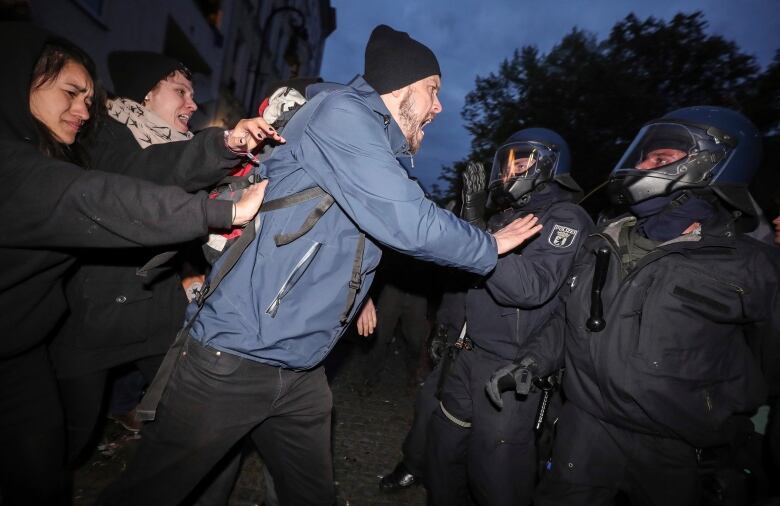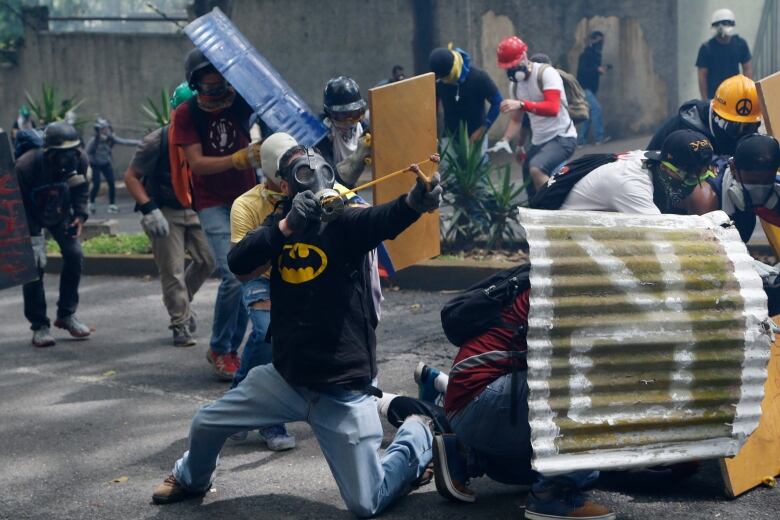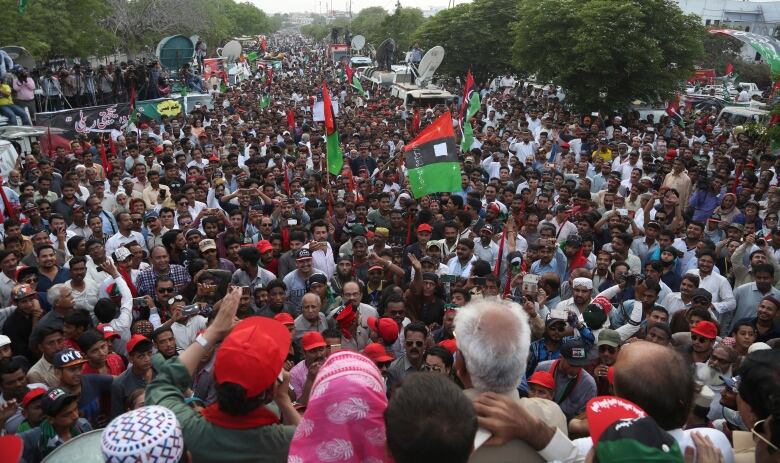May Day marches see large crowds, some clashes with police
Some Paris marchers throw gasoline bombs as police deploy tear gas
A May Day march in Paris turned violent less than a week before the runoff French presidential election.
A few hundred protesters started throwing gasoline bombs and other objects at police at the front end of what started as a peaceful union march in the French capital on Monday.
Police responded with tear gas and truncheons. Riot police clubbed some protesters who were pushed up against a wall on a tree-lined avenue.
The violent protesters were not carrying any union or election paraphernalia. They appeared to be from the same fringe groups that have targeted anti-government protests in the past.
The union activists are still marching separately, although police are interrupting to check bags for gasoline bombs.
The annual march to celebrate workers' rights this year included calls to block far-right presidential candidate Marine Le Pen from winning the presidency.
There were more clashes with police in the eastern German town of Apolda, taking 100 people into custody before declaring the situation under control.
Police told the dpa news agency that about 150 demonstrators who had attended a protest elsewhere started causing problems in Apolda's town centre after getting off a train Monday afternoon.
Authorities say they ignored police warnings and then started throwing stones and firecrackers at officers.
In Berlin, several thousand far-left demonstrators have started a march through Berlin, setting off smoke bombs and firecrackers along their route.

The "Revolutionary May 1 Demonstration" was not registered with authorities as required, but police decided to tolerate the Monday evening march.
Primarily dressed in black, the demonstrators chanted slogans like "flood the G20" referring to the summit of the Group of 20 major economic powers being held in Hamburg this summer.
Some 5,400 police officers, called in from across the country, were on hand.
Police in Istanbul have detained 165 people during May Day events around the city, most of them demonstrators trying to march to a symbolic square in defiance of a ban.
A security department statement said that another 18 people suspected of planning illegal demonstrations and possible acts of violence on Monday were detained in separate police operations.
Stones and bombs in Venezuela
Security forces fired tear gas at youths throwing stones and gasoline bombs on Monday as Venezuela's opposition began a second month of protests against socialist President Nicolas Maduro.
With hundreds of thousands on the streets of Caracas for rival May Day marches, red-shirted supporters of Maduro gathered downtown vowing to defend the socialists' 18-year rule of the South American oil producer.
Twenty nine people have been killed, over 400 injured, and hundreds more arrested in unrest against Maduro since early April, the unpopular 54-year-old successor to Hugo Chavez.

"For no reason, they are starting to repress us," lawmaker Jose Olivares said, as National Guard troops shot tear gas in one district of west Caracas in the morning towards hundreds of people standing around waiting to march.
Most took cover behind trees and walls, while opposition leaders took out phones to film the National Guard. Olivares was injured in the head by a gas canister, the opposition said.
Elsewhere, the National Guard blocked marchers pouring towards a major highway in front of the Avila mountain on Caracas's northern edge. Opposition supporters cheered as youths ran to the front, carrying makeshift shields made from trash bin lids, wood and even a satellite dish.
Some, wearing motorbike helmets, swimming goggles or bandanas over their mouths, threw stones and petrol bombs at the security line, with a protester yelling "No one turn back!"
Others blocked roads in Caracas's wealthier Chacao area with branches and fences. One woman loaded Molotov cocktails from a beer crate onto a motorbike where two men took them to the front line.
Government opponents are demanding elections, autonomy for the legislature where they have a majority, freedom for more than 100 jailed activists and a humanitarian aid channel from abroad to offset Venezuela's brutal economic crisis.
Large marches in Russia, Spain
Two May Day marches were held in Moscow, both drawing from nostalgia for Soviet times.
First, a crowd that police estimated at about 130,000 people paraded across the cobblestones of Red Square, the site of Soviet-era May Day celebrations.
The tradition was revived in 2014 after Russia's annexation of Crimea and is seen as part of President Vladimir Putin's efforts to stoke patriotic feelings.

Spain's two major unions called for marches in over 70 cities under the slogan "No More Excuses." The unions demanded that Spain's conservative government roll back its labour reforms that made it cheaper to fire workers and increase wages and pensions.
CC.OO general secretary Ignacio Fernandez Toxo said "Spain has been growing for two years and now it is time for the economy to align itself with the needs of the people."
He spoke at a march of several thousand people in Madrid, which he led alongside UGT leader Josep Maria Alvarez. Thousands more marched in Barcelona, while other rallies were held in Seville, Valencia and other cities.
Garment workers demand better wages
In Bangladesh, thousands of garment industry workers gathered to demand better wages and legal protection.
Lovely Yesmin, president of the Readymade Garments Workers Federation, one of several unions representing factory workers, said just increasing salaries is not enough.
She said workers must be provided better living quarters and health benefits, and factories must make provisions so the children of factory workers can be educated.
In Taipei, thousands of Taiwanese workers hoisted cardboard signs and banners in a march protesting what they said were unfairly low wages and deteriorating work conditions. A number of them staged a fake funeral procession, carrying a coffin with the words "basic annual pension" written on it, while others waved black flags.
Cambodian riot police watched carefully as more than 1,000 garment workers defied a government ban on marching to deliver a petition to the National Assembly in Phnom Penh, demanding a higher minimum wage and more freedom of assembly.
The marchers, holding a forest of banners, filled a street a short distance from the parliament complex and advanced noisily until they were stopped by a barricade and lines of police, holding batons, shields and guns capable of firing gas canisters. A standoff of several hours was resolved when a representative from the Assembly came out and accepted the petition.
With files from Reuters













_(720p).jpg)


 OFFICIAL HD MUSIC VIDEO.jpg)
.jpg)



























































































